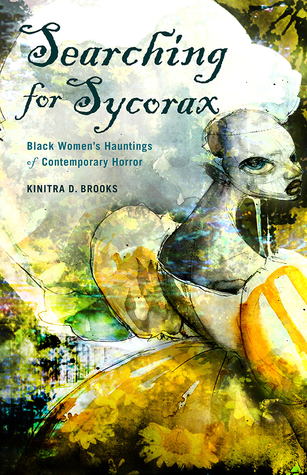
Searching for Sycorax: Black Women’s Hauntings of Contemporary Horror is a literary monograph by Dr. Kinitra Brooks. In it, Brooks presents black women characters as both stereotypical fodder and literary backbone of the horror genre. Making an argument both about what horror is and what it can do, Brooks excavates intersections of black women’s representation in the genre and presents new ways of reading and understanding black women’s role in horror writ large.
Picking up the book, I was very curious about the title, especially the invocation of Sycorax in a work about horror and haunting. Haunting in relation to blackness and fiction is not necessarily a novel concept. There are many black ghosts that haunt the canon of American literature and African American literature (reference chattel slavery and years of racial terror and violence). So I really wanted to know: why call on Sycorax? For Brooks, calling on Sycorax is about interrogating the influence, absence, and power of black women in horror. Invoking Sycorax is about looking to the obscured, erased, and othered women who both influence and haunt while being maligned. Searching for Sycorax, then, is a quest to highlight how black women are represented in contemporary horror and to reveal how black women authors are actively changing it. Each of the five chapters presents an argument that progresses from excavating characters like Michonne from The Walking Dead and outlining connections between horror as a genre to conversations and literary canons of black feminism; to looking at the ways black women authors write through an intersectional framework and detailing what a black women’s horror aesthetic might look like.
This is fully an academic monograph so be prepared for a lot of close readings, canon generation, and a nimble use of a varied theoretical toolbox that includes black feminist theory, genre theory, and contemporary literary theory. I’m not a huge horror buff, but I found Brooks’ arguments about horror both inviting and innovative. Brooks is able to both critique the genre, revealing a good deal about the failures in representing black women by the horror genre, and argue for the efficacy of having black women authors use horror elements in their work.
For me, Brook’s most important intervention is not her practice of unveiling mischaracterized black women in the genre, or her interest in revitalizing the horror genre, but her articulation of what she calls “fluid fiction.”
Fluid fiction is “a racially gendered framework that revises genre fiction in that it purposefully obfuscates the boundaries of science fiction/fantasy/horror writing just as black women confound the boundaries of race, gender, and class.” (p.71) Brooks argues that just as black women are the founders and proponents for intersectional approaches to politics, they also undermine genre distinctions because telling stories that engage black women honestly necessitates such mixing. As a scholar of black speculative fiction, I really enjoyed Brooks’ framework because there is often an incredible amount of handwringing when it comes to black authors and how their work “fits” into canons or genres. I’ve seen many arguments about fluidity or intersection but few that ground dismantling narratives of genre fixity with intersectional analysis so clearly. The possibilities of reading (and re-reading) texts by black women using Brooks’ framework are powerful and endless.
While reading an academic book is definitely different from perusing a novel, if you are a fan of contemporary horror, a student of contemporary literature, or simply have a bit of time on your hands, you might give this book a try.
Alyssa Collins is an assistant professor of English and African American Studies at the University of South Carolina. Her work explores the intersections of race and technology as depicted in 20th century and contemporary African American literature, digital culture, and new media. When she’s not working, she writes about race, superheroes, television, and embodiment around the internet.







Connect with the Sirens community
Sign up for the Sirens newsletter